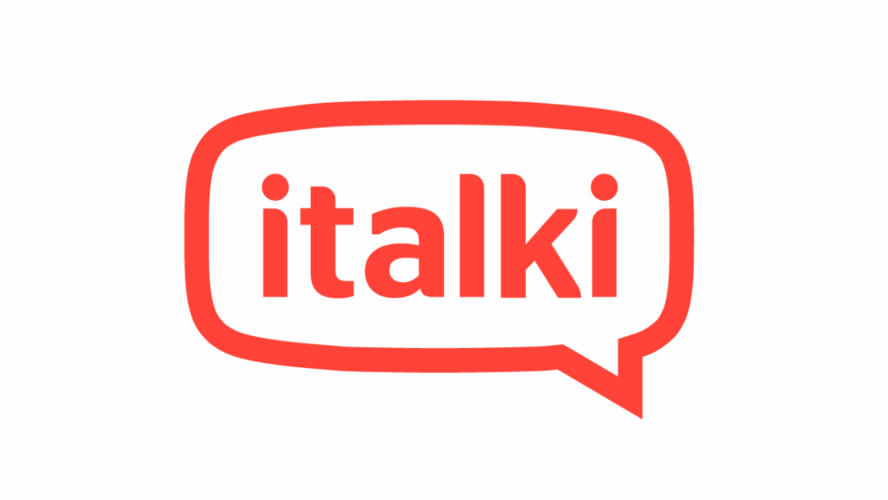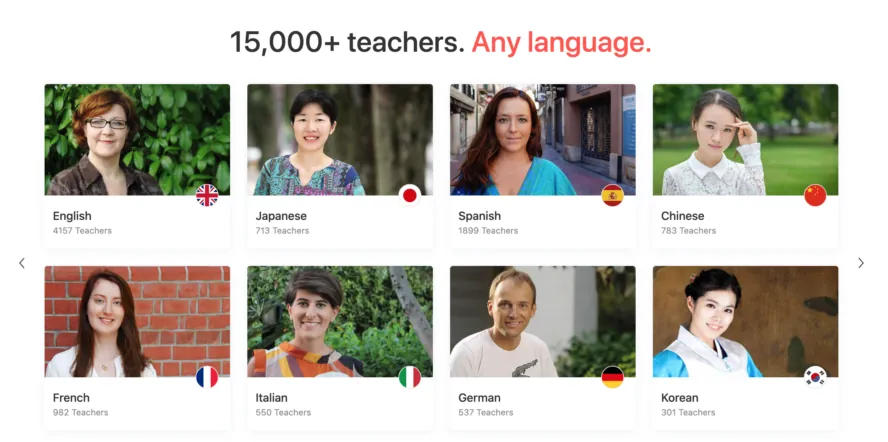TL;DR Summary
italki connects you with real humans — a resource you shouldn’t overlook. It’s not magic: your gains depend heavily on how well you prepare and follow up. Use it to practice (especially production), get feedback, and stay motivated — but balance it with lots of input (reading, listening).
***
The last 15 years have brought revolutionary change to language learning. Amongst the most popular new opportunities is the possibility to connect with native speakers of the languages we are learning via the Internet (specifically via Skype). We all take Skype for granted today, but the app was first launched in Estonia in 2003!
What is italki?
In 2007, italki was launched in Shanghai and registered in Hong Kong. The site is a popular place for language learners to connect with native speakers of languages they are learning, and in particular, tutors of these languages. I have used italki for several languages. In this post, I’ll describe my experience with it, and share how to reap more benefits from each lesson.
What About Input-Based Learning?
I am a great proponent of input-based learning. I believe, along with Stephen Krashen, that we learn languages primarily through meaningful input. As I have mentioned frequently here and on my YouTube channel, the past years have seen technological developments such as MP3 files, online dictionaries, the availability of language content on the Internet, as well as our site, LingQ, which brings all of this together.
These factors combine to make input-based learning more accessible and more powerful than ever before. The Internet has replaced the language lab. However, for many, the ultimate goal of language learning is to speak in the language. Speaking is an integral part of language learning, and investing in speaking does not diminish the importance of ample reading and listening.
At an early stage in our learning, we can only speak to very sympathetic speakers of the language we are learning. We’ll make lots of mistakes, lack fluidity, and may need a bit of patience to communicate. For this reason, italki is quite useful.
What is italki Used For?
I use italki to connect with tutors (often native speakers) in a language that I’m learning. You can take lessons from a tutor, post questions, find a speaking partner, etc.. Here are the main uses of italki:
1-on-1 tutoring
Book private lessons with professional (certified) teachers or with community teachers (native or fluent speakers for conversational practice).
Group classes
Join small online groups for targeted practice.
Language exchange & community
Post on forums, find language partners, and receive written corrections.
Certification & testing
There are language proficiency tests are available for some languages.
My italki Review
There are many ways of finding language tutors online. One need only Google to find them. There are individual tutors offering services, and there are other websites offering language tutors. I have only tried italki because I am used to it, and have found the tutors that I needed. One day I may try other sites.
I have used italki quite a bit, although we have online tutoring via Skype at LingQ. However, for many of the languages I have been studying recently I have not been able to find tutors on LingQ. Instead I have turned to italki and I am, on the whole, very satisfied.
The italki interface has improved greatly over the years and become much more intuitive. There is a large variety of tutors in many languages available for the user to choose from. We can even preview the tutors via a short video. Each tutor can set their own fee. The whole experience is very user-friendly.
Is italki Effective?
What I like
- Tutors set their own rates: There is quite a range of cost. Tutors are divided into professional tutors and community tutors. The latter group are usually cheaper than the former. I have tried both kinds. I have had more success with community tutors, not only because they are less expensive, but because they are more flexible.
- Introductory videos of tutors: All tutors post videos of themselves speaking English and the language I am learning. This gives me a sense of who the tutor is, and possibly the sound and video quality of their setup.
- Tutors are rated by learners: Comments from learners are helpful. This gives me more insight towards their teaching style and other people’s experiences.
- Tutors provide reports: Many tutors, although not all, understand the need to send a report of the learner’s errors, the way we do at LingQ. This often takes the form of a Google Document, which I can import into LingQ for further study.
- There are a lot of tutors to choose from: I am impressed by the number of available tutors, even in less popular languages. You should be able to find a tutor that you like with a schedule that is convenient for you.

What I like less
- Skype connection sometimes not great: The quality of the Skype connection seems to vary from country to country, and from tutor to tutor. A language lesson via Skype with poor Internet connectivity is a strain, and not a pleasant learning environment.
- Tutors who are poor conversationalists: The tutor’s role is to keep me talking. Starting the lesson with “What do you want to talk about?” is not helpful. I am usually not confident enough in the language to control the conversation. A good tutor should have an endless supply of interesting questions to continue the conversation.
- Tutors who impose their agenda: “Today we will cover numbers, colours, the subjunctive etc.” is not how I like to use my time. Since I am paying, I usually am able to persuade the tutor to conform to a more conversational form of lesson.
Recommendations: How to get the most out of italki
- Maintain your input activities: Online lessons at italki or with other tutors are not free. They usually cost between $10 and $30 per hour. Reading and listening, on the other hand, are (mostly) free. Speaking lessons do not replace listening and reading. Input is still fundamental.
- Tie your lessons to your input activities: Make sure your tutor provides you with a report of the words and phrases you struggled with. Study these reports. I have also found it useful to read along with a tutor. Mini-stories from LingQ are a great resource for this.
- Don’t schedule too many lessons:To me, a period of intense online italki lessons means about three hours a week. More than this, and the activity becomes stressful and less fruitful. It also takes away from listening and reading time. That’s when I really get to notice patterns and take a closer look at the language.
- Look up grammar issues on your own: You will become aware of your weaknesses during your lessons. You should consult grammar resources and try to notice these issues in your listening and reading. I like to save phrases that embody these issues while LingQing. I often refer to the grammar related dictionaries that are available at LingQ as I do this.
- Don’t expect to improve quickly: Language improvement is a gradual process. You may do better one lesson, and then not so well the next lesson. As long as you continue with both your lessons and your input activities, you will gradually improve. Trust the process.
- If you don’t like your tutor, change: If your tutor is not satisfactory, or the Skype connection is poor, don’t wait. Find another tutor.
***
Is italki worth it? I think so. The conversation practice resource provides a valuable service. It is but one of the many developments that the Internet and related technologies have brought to the language learner over the last decade or so. It is a great time to be a language learner.
FAQs
1. Is italki good for beginners?
Sure, but keep your expectations in check—early conversations are messy, and that’s okay. You should start speaking when you feel ready.
2. What kind of tutors can I find on italki?
You’ll find professional and community tutors, each with different rates and styles. I often prefer community tutors—they’re affordable and flexible, which suits my approach.
3. How often should I use italki?
I believe that 1-2 times per week is plenty. If you take too many lessons, it’ll start to feel like work. Besides, I’d rather spend that time listening or reading.
4. Can I use italki to learn grammar?
You’ll notice grammar issues as you speak, but don’t rely on tutors to teach it. Better to spot patterns in your listening and reading. You can follow up and find more examples on your own.
5. Is italki worth the money?
In my view, yes. It’s one of the best ways to practice speaking, and it’s convenient. Remember—speaking alone won’t get you fluent. It’s a supplement to lots of listening and reading.
Want to learn language from content you love?







2 comments on “Italki Review: How Does italki Work for Language Learners?”
Comments are closed.
Italki sounds a great site, however my experience has not been good.
I sent a class request to a teacher and clearly informed my issues. During the class she only reviewed an essay with me instead of addressing my difficulties. Basically I just paid for somebody to review an essay, I did not receive knowledge.
I contacted customer service department from Italki twice, they keep returning to me “Learning English is a long-term process”. Honestly, they should address the issue that the goal for my class was not achieved instead of repeating the same over and over.
In addition, I wrote a review about this teacher, however, as of today June-22-2018 it was not published in her profile. Twice I asked customer service when my review was going to be published and they are ignoring this part, their returns do not mention neither provide a reason for the delay.
I checked this teacher comments and ALL of them are giving good reviews. Now I figure out some reviews are not published. To be honest, it would be impossible for a teacher to be perfect and not have a bad review.
My conclusion: Italki site only select good reviews to be published, they manipulate the data in favor to the teacher and themselves, giving the impression everything is perfect there. I am trying to get my review to be published, however I am giving up.
Hey There. I found your blog using msn. This is an extremely well written article. I will be sure to bookmark it and return to read more of your useful info. Thanks for the post. I’ll certainly comeback.